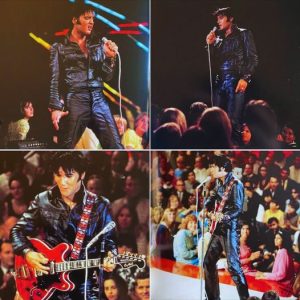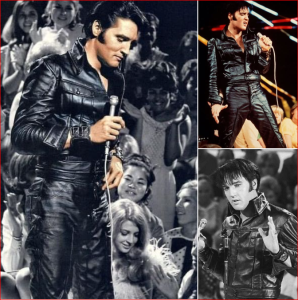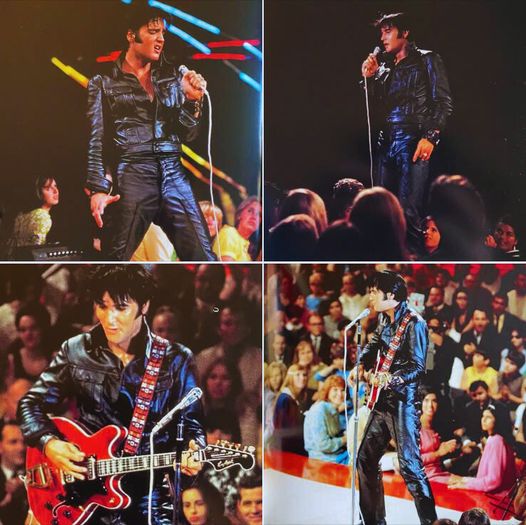Elvis Presley’s 1968 Comeback Special is remembered as one of the most iconic moments in rock ‘n’ roll history, culminating in his electrifying performance of “Blue Suede Shoes.” Originally written and recorded by Carl Perkins, the song had already been popularized by Elvis’s 1956 cover, which helped cement it as a rockabilly anthem. However, it was during the 1968 special that “Blue Suede Shoes” took on new significance, not just as a tribute to his roots, but as a symbol of his triumphant return to the stage. At the time, Elvis was reinventing himself, stepping away from his Hollywood career and reconnecting with his musical roots
The special, which aired on NBC on December 3, 1968, showcased Elvis’s undeniable charisma and raw energy. The performance was remarkable not only for his timeless presence but also for the rare connection between the artist and his fans. With no security barriers or bodyguards, the audience shared an intimate bond with Elvis, respecting the moment and staying in their seats despite the palpable excitement. “Blue Suede Shoes,” a song about individuality and self-expression, became the perfect anthem for this revival, symbolizing Elvis’s comeback and his continued dominance in the world of rock ‘n’ roll. This performance marked not just a nostalgic return to his early days but a reaffirmation of his position as the king of rock, proving that despite the passage of time, Elvis Presley’s influence on music remained as strong as ever

As a fan of Elvis Presley, it’s impossible not to acknowledge how his iconic wardrobe played a massive role in shaping his image and influencing pop culture. From his early days on stage to his later performances, Elvis’s style became as legendary as his music, leaving an indelible mark on fashion that still resonates today.
Elvis’s wardrobe was a statement of confidence, rebellion, and style. His early looks, particularly in the 1950s, embodied the spirit of rock ‘n’ roll. The slicked-back hair, leather jackets, and tight pants became his signature, symbolizing the rockabilly culture that was taking over the music scene. These outfits were not just about fashion—they were a visual representation of Elvis’s persona as the rebellious young star who defied conventional norms. His leather-clad look, especially in his famous “Aloha from Hawaii” performance, remains one of the most iconic fashion moments in music history.
As Elvis’s career progressed, so did his wardrobe choices. In the 1970s, his style became more extravagant, incorporating jumpsuits, capes, and rhinestones that became a signature of his “Vegas” era. The jumpsuits were flashy, bold, and full of personality—just like Elvis himself. They set him apart from other performers and cemented his image as a larger-than-life figure. The glitzy, embellished jumpsuits, often adorned with intricate designs and gems, became synonymous with Elvis and the excess of the 1970s. His wardrobe choices during this time influenced not just musicians, but entire generations of performers, from David Bowie to modern-day pop stars.
Elvis’s wardrobe wasn’t just about making a visual impact; it also communicated who he was as a person. His fashion choices often reflected his moods and transitions in life. For example, his army-inspired looks during his time in the military symbolized a period of discipline, while his jumpsuits in the later years spoke to his confidence and desire to stand out. Fans saw his wardrobe as an extension of his evolving identity, which made him all the more relatable and fascinating.
Even after decades, Elvis’s influence on pop culture remains undeniable. His style was not only revolutionary for the music industry but also for mainstream fashion. Designers continue to draw inspiration from his leather jackets, rhinestone-studded jumpsuits, and bold accessories. His influence can be seen in the wardrobes of contemporary icons, from Justin Timberlake to Harry Styles, who continue to channel elements of Elvis’s style in their own way.
As a fan, I see Elvis’s wardrobe as more than just clothing—it’s a symbol of his cultural impact. His fashion choices helped shape the way rock stars were perceived and inspired countless artists to express themselves through their style. Elvis didn’t just change music—he changed how we think about performance, image, and identity in the entertainment world. His style was as timeless as his music, and its influence is still felt in the fashion world today.

